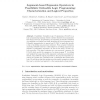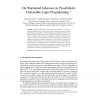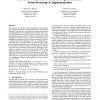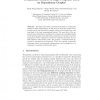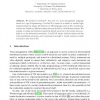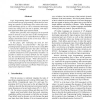146
click to vote
ECSQARU
2005
Springer
15 years 7 months ago
2005
Springer
Possibilistic Defeasible Logic Programming (P-DeLP) is a logic programming language which combines features from argumentation theory and logic programming, incorporating as well t...
105
click to vote
CCIA
2005
Springer
15 years 7 months ago
2005
Springer
Abstract. Possibilistic Defeasible Logic Programming (P-DeLP) is a logic programming language which combines features from argumentation theory and logic programming, incorporating...
116
click to vote
PPDP
2007
Springer
15 years 8 months ago
2007
Springer
Static analyses provide the semantic foundation for tools ranging from optimizing compilers to refactoring browsers and advanced debuggers. Unfortunately, developing new analysis ...
136
click to vote
PADL
2007
Springer
15 years 8 months ago
2007
Springer
Essential elements of aspect-oriented programming can be formulated as forms of logic programming. Extensions of Horn Clause rovide richer abstraction and control mechanisms. Defi...
122
Voted
LPNMR
2007
Springer
15 years 8 months ago
2007
Springer
We show how to deploy the CIFF System 4.0 for abductive logic programming with constraints in a number of applications, ranging from combinatorial applications to web management. W...
127
Voted
LOPSTR
2007
Springer
15 years 8 months ago
2007
Springer
This paper introduces a modular framework for termination analysis of logic programming. To this end, we adapt the notions of dependency pairs and dependency graphs (which were dev...
103
click to vote
ICLP
2007
Springer
15 years 8 months ago
2007
Springer
This note provides background information and references to the tutorial on recent research developments in logic programming inspired by need of knowledge representation.
111
click to vote
ICLP
2007
Springer
15 years 8 months ago
2007
Springer
We propose CoreTuLiP - the core of a trust management language based on Logic Programming. CoreTuLiP is based on a subset of moded logic programming, but enjoys the features of TM ...
103
click to vote
ICALP
2007
Springer
15 years 8 months ago
2007
Springer
In this paper we present the theory and practice of co-logic programming (co-LP for brevity), a paradigm that combines both inductive and coinductive logic programming. Co-LP is a ...
109
click to vote
IAT
2008
IEEE
15 years 8 months ago
2008
IEEE
Logic Programming Update Languages were proposed as an extension of logic programming, which allow for modelling the dynamics of knowledge bases where both extensional knowledge (...
